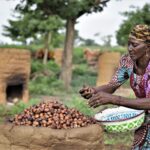In today’s world, as concerns about health, sustainability, and environmental impact grow, organic farming has gained significant attention. Organic farming, a method of crop and livestock production that involves much more than choosing not to use pesticides, fertilizers, genetically modified organisms (GMOs), antibiotics, and growth hormones, represents a commitment to sustainable agricultural practices. It focuses on producing food in a way that cares for the environment, maintains biodiversity, and promotes animal welfare.
What is Organic Farming?
Organic farming is a holistic approach that relies on natural processes and materials to cultivate crops and raise livestock. It avoids the use of synthetic chemicals and emphasizes practices that sustain the health of soils, ecosystems, and people. The goal is to work with nature rather than against it.
Key Principles of Organic Farming
-
Soil Health: Healthy soil is the foundation of organic farming. Techniques such as crop rotation, cover cropping, and composting are used to enhance soil fertility and structure. These methods help prevent soil erosion, improve water retention, and increase nutrient availability, all of which are essential for strong and healthy crops.
-
Biodiversity: Organic farming promotes biodiversity both above and below the ground. By growing a variety of crops and maintaining natural habitats, organic farms support a diverse range of plant and animal species. This diversity helps to naturally control pests and diseases, reducing the need for chemical interventions.
-
Pest and Disease Management: Instead of relying on synthetic pesticides, organic farming uses natural methods to manage pests and diseases. This includes introducing beneficial insects, using natural predators, and employing crop rotation and polyculture to disrupt pest cycles.
-
Water Conservation: Organic farming practices often include measures to conserve water. Mulching, cover cropping, and organic matter addition help retain soil moisture, reducing the need for irrigation. Efficient water use is crucial in organic farming, especially in regions prone to drought.
-
No GMOs: Organic farming strictly prohibits the use of genetically modified organisms (GMOs). The focus is on natural seed varieties that have not been altered in a laboratory. This helps preserve the integrity of plant genetics and supports biodiversity.
-
Animal Welfare: In organic livestock farming, animals are raised in conditions that allow them to exhibit natural behaviors. They are given organic feed, access to the outdoors, and are not treated with antibiotics or growth hormones unless absolutely necessary.
Benefits of Organic Farming
-
Healthier Food: Organic products are free from synthetic pesticides and fertilizers, making them a healthier choice for consumers. Organic farming also tends to produce crops that are richer in nutrients, vitamins, and antioxidants.
-
Environmental Sustainability: Organic farming practices help to reduce pollution, conserve water, increase soil fertility, and promote biodiversity. By avoiding synthetic chemicals and fertilizers, organic farming reduces the risk of water contamination and the harmful effects on wildlife.
-
Climate Resilience: Organic farming builds healthy soils that are better able to retain water and nutrients, making crops more resilient to climate extremes such as droughts and floods. The use of organic methods also helps to sequester carbon in the soil, contributing to climate change mitigation.
-
Support for Local Economies: Organic farming is often associated with smaller, family-run farms that sell their products locally. This supports local economies and helps reduce the carbon footprint associated with transporting food over long distances.
-
Animal Welfare: Organic livestock farming provides better living conditions for animals, ensuring that they are treated humanely. This not only improves animal welfare but also produces meat, dairy, and eggs that are free from harmful additives.
Organic Farming and Africa’s Cash Crops
Organic farming can play a significant role in Africa’s agricultural landscape, especially concerning cash crops like coffee, cocoa, and tea. These crops, which are vital to many African economies, can be grown organically to meet the increasing global demand for organic products. By adopting organic farming practices, African farmers can not only improve the quality and marketability of their crops but also contribute to environmental conservation and sustainable development.
For instance, organic coffee and cocoa farming can enhance soil health and biodiversity in regions where these crops are grown, reducing the need for deforestation and chemical inputs. This, in turn, can lead to better yields over time, higher prices in niche markets, and improved livelihoods for farmers.
Conclusion
Organic farming represents a return to natural processes and a commitment to producing food in harmony with the environment. By prioritizing soil health, biodiversity, and sustainability, organic farming offers a pathway to healthier food, resilient ecosystems, and thriving communities. As we look to the future, embracing organic farming practices will be essential in meeting the challenges of food security, climate change, and environmental conservation.





